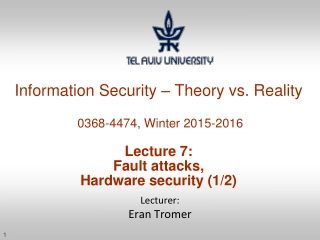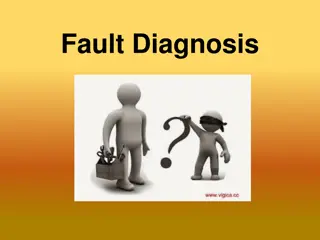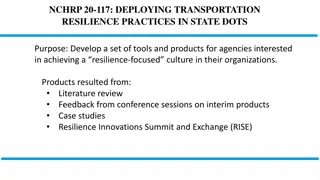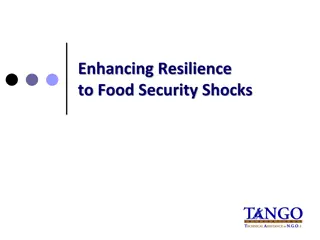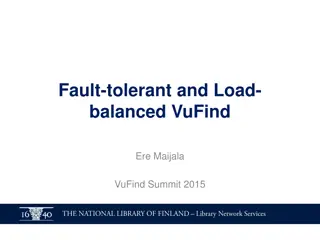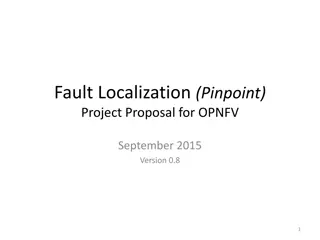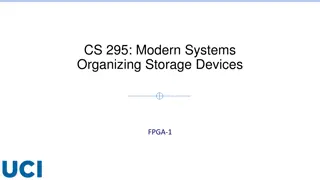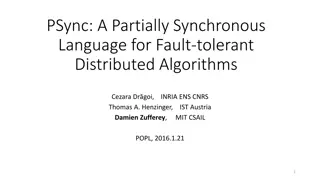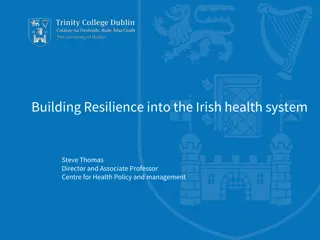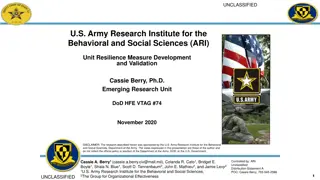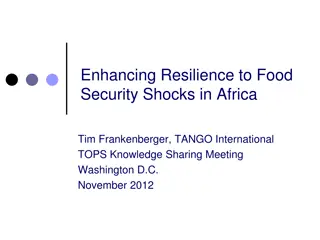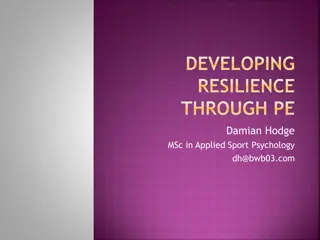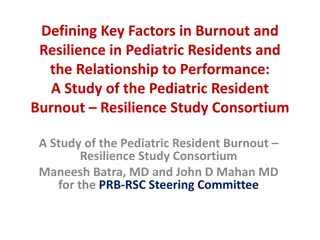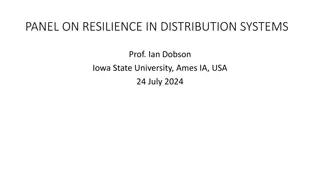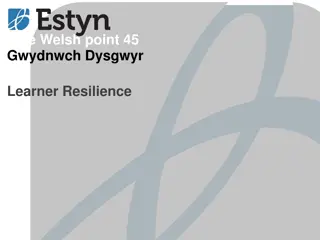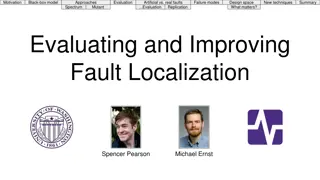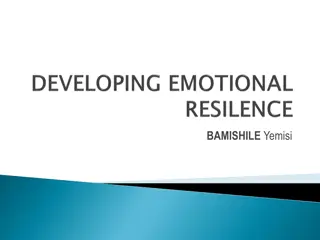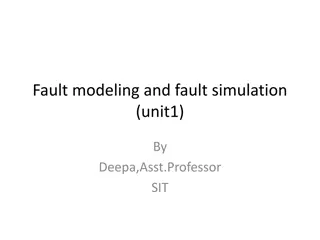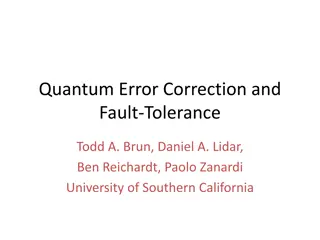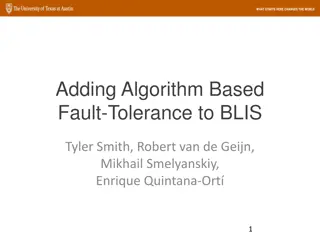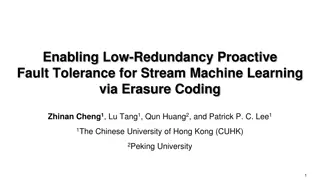Information Security – Theory vs. Reality
Exploring the concept of fault attacks in hardware security, this lecture delves into the various techniques used to compromise systems through non-nominal and nominal channels, as well as the potential risks introduced by trojan horses in the IT supply chain. The discussion includes differential fa
2 views • 37 slides
Enhancing Educational Resilience with RESTA Model
RESTA is an evidence-based intervention model designed to boost Educational Resilience in young individuals by involving educational staff. It differs from other support models by incorporating insights from educational resilience and trauma-responsive practices. Two underpinning models and RESTA pr
0 views • 12 slides
Cisco Systems Fault Managed Power Portfolio Overview
Cisco Systems offers an industry-leading Fault Managed Power (FMP) patent portfolio comprising 24 active assets across seven INPADOC families. The portfolio includes patents supporting fault-managed power systems, PoE deployments, DC power distribution, DC-DC conversion, and HVDC connectors. The FMP
4 views • 4 slides
Enhancing Urban Resilience in BRICS through Integrated Infrastructure and Sustainable Development
Dr. George Tsibani discusses the importance of water resilience, sustainable development goals, and the role of BRICS in fostering smart cities and rural-urban integration. The focus is on building resilience in urban water systems for economic growth and societal well-being. Solutions are proposed
1 views • 14 slides
Cummins Supply Chain Resilience Session Overview
Explore how Cummins has invested in supply chain resilience after a major flood in 2008, including partnering with Horizonscan for a Supplier Resilience Program. Discover insights into their approach, benefits to suppliers, and the importance of supplier resilience. Follow their journey and internal
1 views • 10 slides
Overview of Distributed Systems: Characteristics, Classification, Computation, Communication, and Fault Models
Characterizing Distributed Systems: Multiple autonomous computers with CPUs, memory, storage, and I/O paths, interconnected geographically, shared state, global invariants. Classifying Distributed Systems: Based on synchrony, communication medium, fault models like crash and Byzantine failures. Comp
9 views • 126 slides
Power System Fault Calculation and Protection Analysis
In this technical document, we delve into the calculation of fault current and fault apparent power in symmetrical three-phase short circuit scenarios within power systems. Through detailed equivalent circuit diagrams, reactance calculations, and per unit value derivations, the fault current and app
5 views • 15 slides
Understanding Stress and Resilience in Older Adults
Explore the complex interplay between stress and resilience in older adults, examining models of physical and neurological resilience, recovery trajectories after hip fracture, and dynamic indicators of resilience. Considerations include psychosocial resilience factors like external support, social
0 views • 19 slides
Building Resilience and Dealing with Stress: A University Guide
Explore the concept of resilience, signs of stress, and practical strategies to manage stress while navigating university life. Reflect on challenges, create supportive connections, and improve personal resilience through actionable plans. Remember, resilience is about bouncing back, working through
0 views • 12 slides
Building Resilience: A Guide for Families
Explore examples of adversity and the importance of resilience. Learn what resilience is, how it can be developed, and why it matters. Discover ways parents and caregivers can assist children in building resilience through practical strategies. Myth versus reality around resilience is debunked, emph
0 views • 15 slides
Understanding Fault Diagnosis in Mechanical and Electrical Systems
Explore the essential methods and techniques for fault diagnosis in mechanical and electrical systems in industrial settings. Learn to identify different types of faults, utilize fault-finding aids, and rectify issues promptly to prevent future failures. Discover industry-recognized fault diagnosing
2 views • 27 slides
Disaster Resilience Strategy in Developing Countries Vulnerable to Natural Disasters
The IMF's policy paper highlights key challenges faced by small states in building resilience, such as under-investment and donor support post-disaster rather than pre-disaster. The Disaster Resilience Strategy (DRS) emphasizes three pillars for intervention: post-disaster resilience, financial resi
0 views • 11 slides
Deploying Transportation Resilience Practices: Tools and Insights
Develop tools for fostering a resilience-focused culture in state DOTs through literature review, case studies, and feedback. Explore various definitions of resilience, including organizational perspective, and key observations from the Transportation Resilience Innovations Summit. Emphasize the imp
0 views • 32 slides
Customer Controlled SFI (CCSFI) Fault Raising Guide
This guide by British Telecommunications plc provides detailed instructions on raising a Customer Controlled Special Faults Investigation (CCSFI) fault. It covers topics such as Version Control, Best Practices for Knowledge Based Diagnostics (KBD) and CCSFI, logging in, and step-by-step guidance for
0 views • 19 slides
Guide to Raising a Fault with British Telecommunications plc
This guide by British Telecommunications plc provides detailed instructions on raising a fault, including best practices, version control, and using Knowledge Based Diagnostics (KBD) for diagnosing 21C copper and fibre broadband issues. It covers logging in, running KBD, accessing fault reporting to
0 views • 15 slides
Understanding Seismic Source Parameters in Earthquake Dynamics
The seismic source parameters in earthquake dynamics involve describing a fault as a discontinuity causing displacements, requiring a complex treatment of forces. The Earth's equilibrium necessitates a specific system of forces to explain displacements along faults. The seismic moment tensor, consis
4 views • 32 slides
Understanding Resilience in Food Security Shocks
Resilience in the context of food security shocks involves the ability of individuals, households, communities, and systems to bounce back and recover from various stressors. This resilience is crucial in regions facing continuous crises like the Horn of Africa and the Sahel, where factors beyond we
1 views • 21 slides
Understanding Resilience: A Comprehensive Exploration
Resilience is portrayed as a dynamic process rather than an inherent trait, accessible to all individuals. The capacity for resilience can be developed and harnessed through various resources and support systems. This narrative delves deep into the ordinary yet powerful aspects of resilience, emphas
1 views • 13 slides
Fault Location and Detection in Smart Grids
Fast and accurate fault detection and location are crucial in power grid management, especially in smart grids with bidirectional power flow. This study explores various fault location methods including impedance-based and travelling waves-based approaches. It also discusses the use of Intelligent E
0 views • 10 slides
Fault-tolerant and Load-balanced VuFind Project Overview
Project Background: Part of the National Digital Library initiative, the VuFind project aims to provide a discovery interface for Finnish archives, libraries, and museums. It started development in 2012 due to the insufficiency of existing commercial products. The focus is on enhancing fault toleran
1 views • 19 slides
Building Resilience: From Stress to Strength
Psychological resilience allows individuals to bounce back from stress, adversity, and change effectively. This book by Gaynor Parkin delves into what promotes resilience, highlighting the importance of everyday habits and exercises in building resilience. The evidence presented covers the role of p
0 views • 23 slides
Fault Localization (Pinpoint) Project Proposal Overview
The Fault Localization (Pinpoint) project proposal aims to pinpoint the exact source of failures within a cloud NFV networking environment by utilizing a set of algorithms and APIs. The proposal includes an overview of the fault localization process, an example scenario highlighting the need for fau
0 views • 12 slides
Understanding RAID 5 Technology: Fault Tolerance and Degraded Mode
RAID 5 is a popular technology for managing multiple storage devices within a single array, providing fault tolerance through data striping and parity blocks. This article discusses the principles of fault tolerance in RAID 5, the calculation of parity blocks, handling degraded mode in case of disk
0 views • 12 slides
PSync: A Partially Synchronous Language for Fault-tolerant Distributed Algorithms
PSync is a language designed by Cezara Drăgoi, Thomas A. Henzinger, and Damien Zufferey to simplify the implementation and reasoning of fault-tolerant distributed algorithms. It introduces a DSL with key elements like communication-closed rounds, an adversary environment model, and efficient runtim
0 views • 22 slides
Enhancing Resilience in the Irish Health System During Economic Contractions
The Resilience Project conducted at Trinity College Dublin focused on fortifying the Irish health system amidst economic challenges. The project aimed to identify strategies to protect health resources, manage scarcity, pursue reforms, and anticipate future crises. Three key pillars of health system
0 views • 27 slides
Understanding Unit Resilience in the Army: Research Insights
Resilience at the unit level in the Army is essential for sustained performance and readiness. This research project, sponsored by the U.S. Army Research Institute, focuses on measuring and understanding team resilience components and their impact on overcoming stressors. The study aims to validate
0 views • 22 slides
Byzantine Fault Tolerance: Protocols, Forensics, and Research
Explore the realm of Byzantine fault tolerance through protocols like State Machine Replication and HotStuff, discussing safety, liveness, forensic support, and the impact of Byzantine faults. Dive into decades of research on achieving fault tolerance and examining forensic support in the face of By
0 views • 24 slides
Upcoming Changes to IPEX Fault Reporting Journey
This pack explains the upcoming changes to the IPEX fault reporting journey for customers. A new BT Wholesale Voice Products Ordering and Support System will be introduced in March 2017. Customers will need to transition to the new online IPEX fault reporting journey via the BTWholesale.com web port
0 views • 6 slides
Enhancing Resilience to Food Security Shocks in Africa
Enhancing resilience involves anticipating, adapting to, and recovering from hazardous occurrences in a way that protects livelihoods and supports development. Resilience is vital in regions facing continuous crises due to complex interactions of political, economic, social, and environmental factor
0 views • 32 slides
Developing Resilience Through Physical Education: Strategies and Insights by Damian Hodge
Damian Hodge, an experienced Sport Psychology Manager, shares his expertise in developing resilience through PE sessions for children. He emphasizes the importance of resilience, provides insights on children's experiences, and highlights the significance of fostering resilience in overcoming challe
0 views • 25 slides
Pediatric Resident Burnout & Resilience Study Consortium Overview
This study aims to investigate the factors influencing burnout and resilience in pediatric residents, with a focus on enhancing well-being and performance. The Pediatric Resident Burnout Resilience Study Consortium (PRB-RSC) involves over 20 residency programs in the U.S. to examine the epidemiology
0 views • 18 slides
Enhancing Power System Resilience: Insights and Strategies
Explore the critical aspects of power system resilience in distribution systems, focusing on extreme events, asset hardening, fast recovery, and administrative processes. Learn how resilience differs from reliability, robustness, and other concepts, and discover practical strategies to implement res
0 views • 13 slides
Understanding Resilience in Learners: Key Approaches and Factors
Resilience in learners plays a crucial role in academic performance and emotional well-being. It involves the ability to cope with challenges and adversities. Factors such as self-esteem, self-confidence, and positive relationships contribute to enhancing resilience. This report by Estyn explores ef
0 views • 19 slides
Exploring Fault Localization Techniques in Software Debugging
Various fault localization techniques in software debugging are discussed, including black-box models, spectrum evaluation, comparison of artificial and real faults, failure modes, and design considerations. The importance of effective fault localization and improving fault localization tools is hig
0 views • 24 slides
Enhancing Emotional Resilience: Key Strategies and Benefits
Exploring the concept of emotional resilience, this content covers the definition of emotions, emotional resilience, and the domains of resilience. It delves into the importance of emotional resilience, ways to improve it, and how it helps individuals bounce back from adversity, maintain balance, an
0 views • 17 slides
Comprehensive Overview of Fault Modeling and Fault Simulation in VLSI
Explore the intricacies of fault modeling and fault simulation in VLSI design, covering topics such as testing philosophy, role of testing in VLSI, technology trends affecting testing, fault types, fault equivalence, dominance, collapsing, and simulation methods. Understand the importance of testing
0 views • 59 slides
Fault-Tolerant MapReduce-MPI for HPC Clusters: Enhancing Fault Tolerance in High-Performance Computing
This research discusses the design and implementation of FT-MRMPI for HPC clusters, focusing on fault tolerance and reliability in MapReduce applications. It addresses challenges, presents the fault tolerance model, and highlights the differences in fault tolerance between MapReduce and MPI. The stu
1 views • 25 slides
Quantum Error Correction and Fault Tolerance Overview
Quantum error correction and fault tolerance are essential for realizing quantum computers due to the challenge of decoherence. Various approaches, including concatenated quantum error correcting codes and topological codes like the surface code, are being studied for fault-tolerant quantum computin
0 views • 19 slides
Enhancing Fault Tolerance in BLIS with Algorithm-Based Techniques
Addressing the challenge of soft errors in supercomputers, this paper introduces algorithm-based fault tolerance methods to enhance the resilience of systems like BLIS. By integrating Application-Based Fault Tolerance (ABFT) into BLIS, the study aims to improve error detection and correction mechani
0 views • 48 slides
Low-Redundancy Proactive Fault Tolerance for Stream Machine Learning
This study focuses on enabling fault tolerance for stream machine learning through erasure coding. Fault tolerance is crucial in distributed environments due to worker failures, and existing approaches like reactive fault tolerance and proactive replication have drawbacks. The use of erasure coding
0 views • 20 slides
